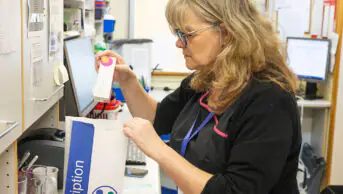
Shutterstock.com
Study results suggest that pharmacist-led sore throat consultations result in fewer same-day antibiotic prescriptions — by a pharmacist or, subsequently, by a GP — than GP sore throat consultations.
The study, published in the Journal of Antimicrobial Chemotherapy on 11 November 2024, revealed that 24% of consultations through the Welsh pharmacy-led sore throat test-and-treat (STTT) service ended with antibiotic supply, compared with 39% of GP consultations.
Antibiotic provision within 28 days of the consultation occurred in 28% of STTT consultations and 40% of GP consultations.
The STTT service is available in more than 80% of community pharmacies in Wales and allows pharmacists to provide antibiotics to adults and children aged five years or older where they have clinical symptoms suggestive of a group A streptococcal infection and is confirmed using a rapid antigen detection test (RADT).
The service was launched in November 2018 as a pilot and started being rolled out to all health boards in Wales the following year.
The retrospective, longitudinal cohort study looked at patients aged six years or older who had a sore throat consultation between 1 November 2018 and 28 February 2020.
The researchers estimated that every 100 patients presenting with a sore throat at an STTT pharmacy resulted in a drop in antibiotic prescriptions by approximately 15 to 18 prescriptions.
They concluded that even in their “worst-case scenario” modelling, the availability of the STTT service was found to save at least 69 GP consultations for every 100 patients with sore throat symptoms.
The authors added that the study provided further evidence that the pharmacy-led STTT service was “safe, cost-effective and contributes to antimicrobial stewardship”, adding that it provided “a blueprint for data-enabled rapid evaluations of community pharmacy services”.
“Commissioners of similar pharmacy services should consider a structured approach, including rapid diagnostics, to support clinical assessment, where appropriate,” they said.
A study by the same authors, two years ago, found that antibiotic supply rates by pharmacists were significantly higher when RADT testing was not routinely available.
A spokesperson for the Welsh government said: “These findings reinforce those of previous studies which demonstrate the important role community pharmacists play in providing Wales’ nationally commissioned STTT service. The service helps to reduce demand for and improve access to other NHS services and contributes to efforts to prevent the unnecessary use of antibiotics.
“Importantly, this study found lower rates of antibiotic prescribing by both pharmacists and GPs than those which have been previously reported, demonstrating the concerted effort all healthcare professionals in Wales are taking to promote antimicrobial stewardship.”
In England, The Pharmaceutical Journal first reported that an STTT service was being developed in May 2021, when it was included in the data standards for IT system suppliers that would enable pharmacy staff to update GP records.
However, by 2023, a freedom of information response to a request for details on whether England would follow Wales in introducing national strep A testing confirmed that plans to introduce an STTT service in pharmacies in England had been dropped, and this was not ultimately included in updated pharmacy IT standards.
Results from a study published in The Lancet on 16 September 2024 showed that antibiotic-resistant infections could cause more than 39 million deaths across the world between now and 2050.


